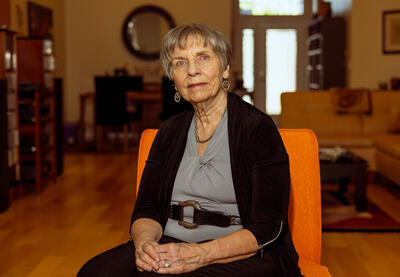In 2015, I moved to Sarasota, Florida, after retiring from a 35-year career in education. Attracted to Sarasota because of its renowned beaches and extraordinary cultural offerings, I had no idea that Sarasota would soon become the epicenter of the cultural war for education or that I would be countering attacks and working to ensure inclusive education for all students.
In my early years in Sarasota, I was appalled at the attacks on learning from state government, which for years sought to defund and privatize education. Concerned by the 2017 passage of Florida’s House Bill 7069—a bill that transferred funding from public schools labeled as “failing” into for-profit corporate-managed charter schools—I formed Protect Our Public Schools (POPS), an organization to educate the public about these attacks.
POPS grew in numbers and became the area’s leading pro-public education voice. In 2018, POPS successfully urged the Sarasota school board to reject the application of the nation’s largest for-profit charter school provider. POPS then urged neighboring Manatee County schools to adopt the community school model with academic and social service supports for children and their families rather than close two elementary schools designated as “failing.” The Manatee district now has two thriving community schools, one fully implemented and one emerging.
Then in March 2020, the COVID-19 pandemic hit, and everything ground to a halt. When schools reopened in August 2020 with a remote option and a mask mandate, the Sarasota school board meetings became a war zone. As if on cue, extremists showed up to intimidate anyone supporting masking and claimed teachers were indoctrinating students.
But young people, particularly current and former students of color, challenged the extremists.
The 2020 national election brought a short-lived calm that was broken when Gov. Ron DeSantis launched his culture war on education. Simultaneously, three Florida women, including the current chair of the Sarasota school board, formed Moms for Liberty, a group described as an extremist anti-student inclusion group by the Southern Poverty Law Center.
By spring of 2021, extremism returned to Sarasota schools with disinformation and protests that critical race theory—a theory taught at law schools and graduate school programs about the role of systemic racism in shaping laws and social structures—was rampant throughout K-12 education. They argued that historical aspects of slavery, racism or the Holocaust were making some children, particularly white children, feel guilty and pushed to erase the history of students of color. Simultaneously, vicious attacks on the rights of the LGBTQ+ community occurred.
When the Sarasota superintendent held a series of town hall meetings to gain community input on a five-year plan, extremists converged on these meetings. The meeting that I attended turned ugly, with extremists warning school officials that they knew where officials and liberal school board members lived. Outnumbered, my small group left, shaken by the hate displayed that night.
Signs of trauma currently exist all over our community. Teachers must navigate vaguely written laws and can face felony charges if they share “unsuitable” material with students.
Things took a turn in 2021 when the Sarasota school board voted 3-2 to join 11 other Florida districts in defying the governor’s plan to end mask mandates amid skyrocketing COVID-19 cases. While supportive parents came out in droves when the board’s mask mandate vote was taken, few made other meetings due to COVID concerns and their fear of extremists. This allowed extremist groups to gain a foothold.
As COVID-19 numbers decreased, a group of mothers of school-aged children banded together with ideas similar to POPS. These mothers denounced the hatemongering and explained how these attacks were creating chaos to destroy public education and weaken democratic values while real education issues—like reducing educational inequity for students of color and providing financial resources for public schools—were ignored. They formed Support Our Schools (SOS), a nonprofit organization with the mission to “organize, educate, and empower parents and community members to defend public schools.” I joined their executive board when POPS voted to merge with SOS so we could become one strong force. Simultaneously, I launched a research project to better understand the extremism that had so dominated Sarasota, research which received extensive national media coverage.
The 2022 Sarasota school board election showed the importance of voting, particularly at the local level. Low voter turnout and the roles played by right-leaning politicians and extremist groups contributed to the election of conservative candidates, thus beginning the next chapter of attacks against inclusive schools.
Signs of trauma currently exist all over our community. Teachers must navigate vaguely written laws and can face felony charges if they share “unsuitable” material with students. Growing numbers of parents are horrified by book bans and the rewriting of history to maintain white supremacy. LGBTQ+ youth, especially trans students, are afraid.
Yet change began to happen in 2023 as more people showed up and spoke out against extremism at school board meetings and in support of a moderate school board member, attacked as a “groomer” because he is gay. The firing of a popular superintendent after the new conservative board took office also woke people up. Then in rapid succession the school board banned books, censored curricula, and eliminated a social emotional learning (SEL) program that teachers supported and students found helpful.
In opposition to a recent board proposal and in support of finding a superintendent who would prioritize education and students, hundreds of Sarasota residents attended rallies and participated in hours-long public commentary. And by a narrow 3-2 margin, the board decisions followed a path of reason, with even two of the conservative members voting for truth.
With a focus on truth and justice, we’ve started to reclaim the narrative from a loud vocal minority. When people stand together and speak out against extremism, positive change is possible. The community has a lot of work to do, but I have hope that through increased civic engagement, justice will prevail.
